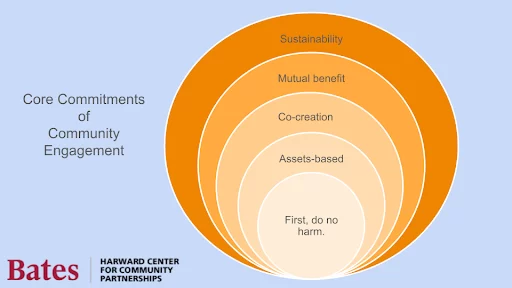Mission, Values, Vision, and Goals
Mission Statement
The Harward Center advances the College’s commitment to informed civic action and responsible stewardship of the wider world through reciprocal and sustained partnerships that simultaneously meet community needs, enhance academic work, and develop leaders who are empowered to enact social and environmental change. We foster sensitivity and confidence to engage cross-culturally and encourage collaborative inquiry into issues of local and global significance.
For insight into our approach to community engagement, please consider this brief article by Harward Center director Darby Ray.
Values
At the Harward Center we value:
Place
- We embrace Bates College’s location and seek to be engaged, accountable, and justice-seeking members of the city of Lewiston and the state of Maine.
- We recognize the wisdom, experiences, skills, and talents of the people and organizations who call this place home.
- We commit to sharing resources to help address local challenges.
- We acknowledge the privilege and shortcomings of our institutional home and of our Center’s programs and practices, and we humbly but optimistically work to shift the inequities that have benefited us.
Partnership
- We seek to build relationships that are rooted in trust and that embody reciprocity, collaboration, co-creation, and mutual transformation.
- We commit to deep listening to our partners, community, faculty, staff and students as the wellspring of our work.
- We aspire to partnerships that are deep, sustained, strategic, and mutually beneficial.
- We commit to long-term accountability and actively seek feedback and constructive criticism from our partners.
Power reimagined
- We commit to continuous, substantive dismantling of white supremacy and other exclusionary modes of power.
- We acknowledge that despite good intentions, practices of “community service” often perpetuate power inequities and systems of racial and social injustice.
- We commit to practices of critical community engagement that actively work to shift power dynamics in pursuit of a more just and inclusive world.
- We recognize and defer to the wisdom of lived experience and work to understand our own privilege from a standpoint of cultural humility.
Potential
- We embrace the potential of both individuals and collectives for life-giving, justice-seeking, joy-filled work.
- As educators and employers and as members of the wider Bates and Lewiston communities, we aspire to create spaces, policies, and programs that nurture belonging, equity, skill-building, opportunity, growth, and joy.
- We see students as whole people whose being and doing are inextricably linked. We aspire to meet students where they are and actively support their academic, emotional, and holistic growth.
- We cultivate courage and community for the work that lies ahead.
Vision Statement
Every student will have the skills and inspiration to collaborate with diverse others to advance the greater good.
Goals and Objectives
The Harward Center supports diverse curricular and co-curricular experiences through which participants develop:
Civic awareness
- Recognizing oneself as a member of a larger social and ecological fabric
- Recognizing oneself as a citizen with the capacity and responsibility to work with others to advance the greater good
- Developing self-awareness about the impact of one’s choices on different constituencies and entities, including the planet
Civic inquiry and deliberation
- Inquiring about the civic and environmental dimensions and public consequences of a subject of study or course of action
- Considering differing points of view and making informed moral and civic judgments
- Deliberating with others to define public problems and identify constructive approaches for addressing those problems
Civic action
- Working to build, sustain, reform, and improve the communities to which one belongs
- Collaborating with others—often across lines of cultural, partisan, racial, or economic difference—to address common problems and shape common life
- Advancing the full participation of all people in the decision-making processes that affect their lives and communities
What We Mean
At Bates, community engagement refers to the process of working collaboratively with off-campus partners to pursue shared goals. Community engagement is integrated throughout the Bates student experience, including academic coursework and research, student leadership programs, clubs and teams, residence life, and summer opportunities. Students, faculty, staff, and off-campus community members look to the college’s Harward Center for Community Partnerships for leadership and resources related to community engagement.
As befits a college whose mission emphasizes the cultivation of intellectual discovery and informed civic action (Bates College mission statement), Bates offers a robust program of community-engaged learning. Through a wide range of community-engaged academic courses and research projects, students collaborate with off-campus organizations to advance community-identified goals and initiatives while advancing their own learning, personal growth, and civic identity. Community-engaged learning can take many forms, but it always prioritizes both student learning and community benefit, and it is always rooted in collaborative partnerships. More on community-engaged learning may be found here.
High-quality community engagement prioritizes standards of ethical behavior for college participants throughout the experience, from the initial planning stages to the final evaluation. Among the commitments that characterize high-quality community engagement of all sorts are these:
- “First, do no harm” – an ongoing commitment by the college/university to ensure that community engagement foregrounds the safety and well-being of the community it seeks to engage, as defined or affirmed by the community;
- Assets-based perspectives – counteracting the tendency for community engagement to be “damage-based” (Tuck, 2009) or to focus primarily on the deficits within the community being engaged, ethical community engagement foregrounds instead the strengths and cultural capital (Yosso, 2005) of the community;
- Co-creation – collaborative communication and decision-making as constant priorities in every engagement;
- Mutual benefit – both (or all) partners receive an identifiable benefit from the engagement;
- Sustainability – investing in long-term relationships, partnerships, and projects.
- Accountability – regularly evaluating relationships, methods, projects, and impacts in order to improve future work.
